Socialist victories in Venezuela, Bolivia, show resistance is possible
Bolivia and Venezuela have recently enjoyed significant socialist victories in their presidential and legislative elections, respectively. Two countries that the United States and its allies have continued to undermine and target for regime change.
We examine how they have managed to resist against the sanctions, attempted coups and imperialist aggression from the United States and its allies.
The United States has a long, bloody history of carrying out coups, covert operations and imperialism in Latin America. Unfortunately, that still seems to be the case, particularly in Bolivia, and in Venezuela.
Attempted coup to oust Evo Morales
Just last year, in 2019, we saw the president of Bolivia, Evo Morales, ousted in a right wing coup backed by the United States, particularly the Organization of American States the OAS, which is based in Washington DC and receives most of its funding from the United States and has been a tool of imperialism, leading back to the Cold War. The OAS claimed that Evo Morales had cheated the election and accused them of fraud.
Of course the mainstream media ran with this line and repeated this narrative; we saw it in the New York Times, we saw it in the Washington Post, they didn't hesitate to amplify this lie that was being put forward by the coup plotters and this fascist right wing coup that was taking place.
We saw Evo Morales's house being vandalised, we saw ministers and their families targeted, people were killed and Morales was forced into exile. So, to claim that he quit over election fraud when this was actually a coup, backed by the OAS, backed by the United States, is absurd.
Accusations of election fraud shown to be false
These accusations of fraud were, of course, proven to be false, just a few months later and even reported in the New York Times as being false.
Evo Morales was the first indigenous president of Bolivia. He's an anti imperialist, a socialist, and of course this doesn't suit the agenda of the United States.
Bolivia sits on the world's largest reserves of lithium; this is of course very convenient for the West and their multinational corporations who will do anything to get their hands on such an abundance of precious resource.
They would love for a government to take over which would be more amenable to giving away these resources to private corporations, which is what we saw from Jeanine Áñez, who was the de facto interim president and a member of this coup, of this fascist takeover.
MAS, in Bolivia returned to power in landslide victory
However, one year later in November 2020, the movement for socialism, MAS, in Bolivia returned to power in a landslide victory under Luis Arce. This was a clear and resounding defeat for the coup plotters, not to mention the imperialist aggression against Bolivia.
Similarly, just last week, we saw another socialist victory, this time in Venezuela. With the new legislative elections that were held on December 6. The United Socialist Party of Venezuela the PSUV, which is the party of President Maduro, won 68% of the vote, and captured 67 seats in the National Assembly, despite the various attempts by the United States to oust Maduro.
As we've seen, they've put crippling and brutal sanctions on Venezuela as part of their maximum pressure campaign that have devastated the civilian population.
Earlier this year, we also saw an attempted coup, a private mercenary group named Silvercore, with ties to President Trump, which failed so miserably that it was nicknamed the ‘Bay of piglets’.
Maduro recognized as president by the UN
We have also seen the USA try to oust Maduro by attempting to recognize the former leader of the National Assembly, Juan Guaidó, as the legitimate president, even though he's not. The US even had their allies do the same thing; around 60 countries gave in, even though Guaidó was not the President, Maduro was the president as recognized by the UN. To understand more about the legislative elections that just took place in Venezuela, and the presidential elections last month in Bolivia we turn to Anya Parampil, a journalist and contributor at the grey zone, who was present in both countries during these elections.
Anya Parampil is based in Washington, DC. She has produced and reported several documentaries, including on-the-ground reports from the Korean peninsula, Palestine, Venezuela, and Honduras.
We've been hearing from all these Western governments that the legislative elections that just took place in Venezuela are illegitimate. Anya Parampil was there, on the ground, having been to the polling stations and spoken with the people. Richard Medhurst asked whether these claims have any substance whatsoever?
No that's the issue here; people that I spoke with made the point that the United States always does this before elections in Venezuela, especially considering the main contingent of the opposition, which is backed by the United States, led by the coup leader, Juan Guido, whom the United States recognized as president of Venezuela last year.
The US has been pressuring that side of the opposition to not participate, to boycott the election in an effort to delegitimize the vote and make it seem as though the PSUV party, the Socialist Party here in Venezuela, has no opposition. And when they when they do that when they pressure that party not to participate, they then even weeks, days before the vote takes place, claim that there's going to be fraud, claim that there's going to be a stolen election and yet they never produce hard evidence.
So the people here are tired of that, that's to say they said that we're used to this line from the United States, and many of the people that I spoke with at the polls made the point that if the United States wants to talk about a shady or fraudulent election, they should reflect on what's happening in the United States right now, that the US should really focus on its own system, take a hard look at itself before criticizing Venezuela.
Around 31% of eligible Venezuelans participated in this election in the middle of a pandemic. They only recently started the process of reopening the country after a pretty strict lockdown. So that was really a way of standing up and saying they reject these claims by the United States.
Anya Parampil, journalist and contributor at The Grey Zone
US elections versus Latin American polls
You were in Bolivia as well, part of a delegation of election observers, and you're in Venezuela now so you've been seeing how these socialist victories have unfolded in Latin America. How do these elections in Latin America contrast with what we were seeing in the US last month, and the so called democratic process in the West?
As you know, if they want to come and claim electoral fraud, there is no basis for that. We're just hearing this, this narrative, from governments seeking regime change. Is it a coincidence that they're only alleging these things in Bolivia and Venezuela, which are sitting on top of the largest reserves of oil and lithium in the world?
This is such an important question because it gets to the core really of why I wanted to come to Venezuela and visit Bolivia and witness their electoral process here. And that's because I think those of us in the United States who would like to see a change in our government who would like to see a government which actually worked for the people have so much to learn from from the system's here in Venezuela, and in Bolivia as well. What I witnessed in both countries is a system, especially in Bolivia where voting is actually mandatory, people are penalised if they don't participate in the election. There is an enthusiasm and an eagerness to vote.
In Venezuela, this time numbers weren't as high as people, as I think people in the PSUV party had hoped for, but there are many factors contributing to that; the pandemic, the fuel crisis, sanctions, people are very tired and also there was a sense that PSUV was going to win comfortably, so there wasn't the same need or incentive for people to show up at the polls in massive numbers, especially if they supported that party.
But what I learned in being here in Venezuela and being in Bolivia is that voting is actually a very small part of the democratic process. In the United States, especially in the lead up to this last election, there was so much of an emphasis placed on voting, [stressing] that this is the most important thing you can do, it's your major duty as a civilian participating in a democracy.
And here, that's not really the case, they have organised social movements and workers unions that are really what serve as the base of democratic engagement in these countries; something that we're completely missing and lacking in the United States. And that's, that's especially important when I talk about Bolivia because that's how they were able to defeat the right wing coup installed government. They delayed elections repeatedly, the coup government in Bolivia, four times they had to reschedule the election and the only reason that they ultimately held a vote was because the organized forces on the ground, workers and social movements threatened to shut the country down completely; they were blocking roads.
They were threatening to hurt the economy by not allowing shipments of cargo) and making life more difficult for the government, and it was that organization that actually enabled and enhanced their democracy and so we have to learn from, from the people here about how we can build stronger movements and institutions in the United States that then are reflected in voting. Voting is actually just the very basic obligation in a democracy but there's a lot more that we can do to encourage the people struggle.
Anya Parampil, journalist and contributor at The Grey Zone
In an exclusive interview, Venezuelan Minister of Foreign Affairs, Jorge Arreaza, responds to question put to him by Richard Medhurst, Author, Journalist and host of The Communique show on PressTV.
Richard Medhurst: Joining me from Caracas is the Venezuelan Minister of Foreign Affairs, Jorge Arreaza. Thank you for coming on the show, Your Excellency; it's a pleasure to have you.
Jorge Arreaza: Hi, Richard My pleasure, my honor to be here.
Richard Medhurst: We're hearing from Western countries especially that, you know, the election was somehow legitimate and they were actually saying this before it even took place. What is your response to those criticisms?
Jorge Arreaza: Oh, we're used to it you know they are having this kind of complaints, even in advance since 2017. They decided that the opposition in Venezuela the bourgeois opposition should rule to take power in Venezuela because maybe they, they are alike to the European elite and to the elite in the United States so they have tried, by all means to make this happen they have tried to not recognize the elections to impose a fake government to be behind the coup attempts to kill the president, so it's it's maybe a natural reaction because we are building a new way of organizing our society. We have a lot of natural resources, oil, gas and minerals, and they decided that there cannot be a socialist revolution in Venezuela, but our people decided that there will be a socialist revolution in Venezuela, and we keep on winning political spaces, and last Sunday's election was a very good election was an heroic victory for the Venezuelans whom in spite of the sanctions or the lack of a fuel so many obstacles, went to the ballots and they elected the new National Assembly.
Richard Medhurst: How do you respond to the critics who say that even though your party got the majority of the votes the overwhelming majority 68%, that the voter turnout was low was around 31%?
Jorge Arreaza: We're in the middle of a pandemic, there is lack of fuel in Venezuela, we have been under aggression, the opposition boycotted the election. The US government says that you cannot vote in an illegitimate election. And, of course, it's election for the members of parliament, it's not the same as presidential elections, each election in Venezuela is different. And, for instance, in 2005 for the election for the National Assembly the turnout was 25%. And there was no aggression, there was [plenty of] gasoline, there were no obstacles and Washington was not interfering. So that's why I say this has been heroic because, in spite of all these circumstances the Venezuelan people has regained have regained the National Assembly, new deputies have been elected, and we are going to have a legislative power back in Venezuela.
Richard Medhurst: What do you expect to see from the opposition next because the entire premise of Guido's supposed legitimacy was that he was the head of the National Assembly. He's not the head anymore so where are they going to draw this legitimacy from now, because the UK and the US have said that they will continue to regard him as the president of Venezuela?
Jorge Arreaza: Today I read a statement or an interview, I believe, from Enrique Caprice, who used to be one of the most important politicians in the opposition, and he states that there is no leadership in the opposition, there is no leader, and he is right, they are fractured. they are divided, they, they did things wrong, they submitted themselves to Washington, so now they have no future, the way that they have been behaving, so I don't really know what can happen, but that's their own issues, their own their own theme, so let them discuss and let's see if they can get united or if they finally divide absolutely that's none of our business. But what is going to happen is that next January the fifth, we will have a new National Assembly in Venezuela, and I am surprised that you can still that you remember the name of this deputy of Mr Guido because most media they had a lot of trouble to learn how to write his name. And now they have left, they have forgotten how to write it. That's the reality.
Medhurst: Yeah, it's, it's quite funny how they're promoting someone that Venezuelans don't even know I mean, it's absurd. I wanted to ask you about Iván Duque Márquez the Colombian president, he actually blocked a plane from leaving over Colombian airspace from Venezuela back to Mexico, a plane full of international observers, you know, they complain about lack of legitimacy and transparency when they're also blocking international observers and what do you make of that?
Jorge Arreaza: If it were not so delicate and grave, we could say their childish behaviour, but we're used to it in Venezuela, the thing is that just today more than 200 of the over 300 observers that came for the elections had to suffer this this small expression of the blockade against Venezuela. So, in spite of the fact that the national authorities of Venezuela had the over-flight permission, a week ago, when the plane was about to take off they decided that they cancelled this authorization. So, it's now in Colombia the mercenaries have been trained, and with the support of the government, to attack Venezuela. Mercenaries from Venezuela, with, you know, this defected militaries and mercenaries from the United States, former Green Berets that trained in Colombia, they tried to come to Venezuela and to kill the president, to kill other political leaders. There are still many mercenaries in Colombia being trained to attack Venezuela.
They have tried to block us, that you have to understand that this, This fellow Duquesne is not the president of Colombia, he's just a man that works for the elite in the United States. Now I like Donald Trump was the president of a big corporation and the CEO. And this was one of the main executives and him and also NATO, and others. At some time, at some point, they can be promoted if they attack if they try to isolate if they try to kill the Venezuelan project. So we are used to it but we have, we have learned to have strategic patience. The people are Argentina, Mexico, and I am sure of Chile, Ecuador, Colombia, Brazil will change these governments and everything will come where it should be.
Medhurst: What do you expect to see from the incoming Biden administration? How do you think the relationship is going to be between Venezuela and the United States in January?
Jorge Arreaza: Well, you know, we've been 22 years in power. And we've learned that the imperialist government of the United States, the system of the United States is one, despite who is ruling and which party is in the White House. So we don't have very high expectations. There are some differences. Maybe it's formal, but the thing is, if the United States elite wants to rectify, or wants to have better relations with Venezuela, we are open. We even tried to have dialogue with Mr. Trump. It happened to some extent, but not, as we expected. We shall see if there is a better opportunity with Biden, but it's not something that changes the Venezuelan history. If they want, we want, if they don't want, we will prevail.
Medhurst: Do you expect to see any kind of detente at all? Or do you think it's going to be a continuation of this imperialist aggression on Iran on Venezuela and attempting to take over the oil the energy sector and curb Venezuela's military?
Jorge Arreaza: Imperialism has its goals, its objectives, and they are always there, some government come, try to change tactics, but this strategic path is already designed. It was designed 200 years ago, and we don't expect different behavior from the United States. But if we are surprised, and they change, because they feel the pressure of their own people, or these demonstrations, and they need to give some signals in the world, we will receive the any move, how it should be, but if they behave like they have, until now, it's in our plan. So we will continue going forward in spite of the fact of who is in the works.
Medhurst: So we've seen a real friendship and Alliance developing between Iran and Venezuela, Iran recently sent another shipment of fuel tankers to Venezuela. What kind of further cooperation can we expect to see between the two countries?
Jorge Arreaza: We've had a great relationship with Iran since 2003. And it's, it's been getting even more closer and more integral, because we are advancing in new sectors that we hadn't before. And that we should find Mr. Trump for this last steps that we have taken because we've come even more together because of the aggression against Iran and against Venezuela at the same time. So this is a relationship that is going to grow, it's going to expand, and we are very honored of having this kind of relation with you.
Medhurst: What do you see in regards to the economic situation? COVID-19 these brutal sanctions, that maximum pressure campaign, because, you know, we're seeing it in Venezuela, we're seeing in my country, in Syria, we're seeing this in Iran, and it's really hurting the civilian population. So I mean, where do we go from here?
Jorge Arreaza: Yes, I believe that this is a time when the world is transforming. We are building a multipolar world. And this is a fact mainly the entire imperialism is not only the United States government and the league, it's also elites in Europe, you have suffered of this. And other places. It's it's this group of corporations taking decisions for the governments. And we are sure that this is this is going to change and the multipolar world is, is being born. And it's a matter of us now, being attacked, or being marginalized, getting together we are the real world, the world isn't the South is the countries that want to be free, the people that want to be free. So it's a matter of coordination. And after having the capacity of planning together or executing plans together, that we can make this world more peaceful, more secure, and stop imperialism, imperialism is is going to disappear this century. But we have to be intelligent, and we have to be united in these strategies to confront the last year of this monster that is dying.
Medhurst: Your Excellency, I'm really grateful for your time and for coming on the show. It's truly an honor and a privilege to host you. Thank you so much.
These socialist victories, in Venezuela, in Bolivia, should not be underestimated. These show that resistance is possible, they show that anti imperialism is possible, they show the power of alliances, and what can be done in the face of adversity. The people of Venezuela, the people of Bolivia have shown that they will not be subdued or subjugated they will not submit themselves to the will of the United States and its allies and multinational corporations that seek to steal their land and their resources and their wealth in plain sight.
Trump compromised by Israel, Epstein files reveal
Iran, China, and Russia to hold joint naval exercise
Leader visits Imam Khomeini’s mausoleum ahead of 47th anniversary of Islamic Revolution
‘Our hands are on the trigger’: Iranian army chief warns Israel, US against mischief
Death toll from Israeli attacks across Gaza rises to 29 since dawn
Apple takes over ‘secretive’ Israeli surveillance startup Q.ai
Iran FM: US must abandon threats; Iran ready to respond to aggression
VIDEO | US protesters begin nationwide strike over ICE killings


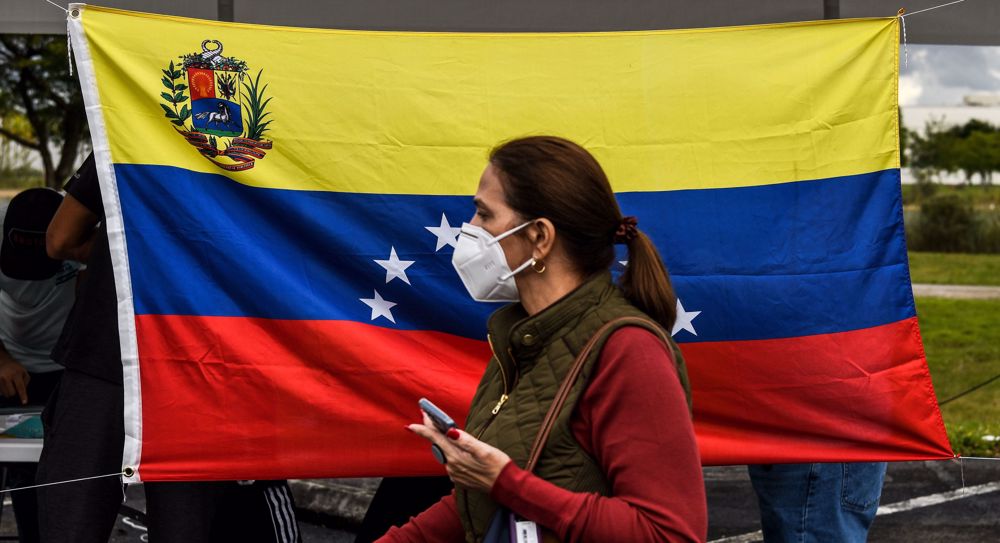







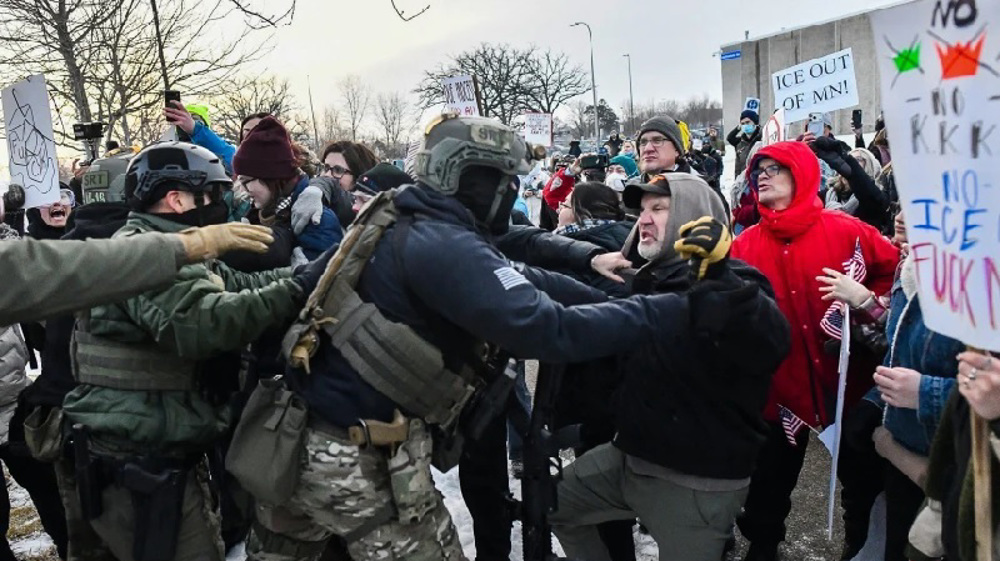

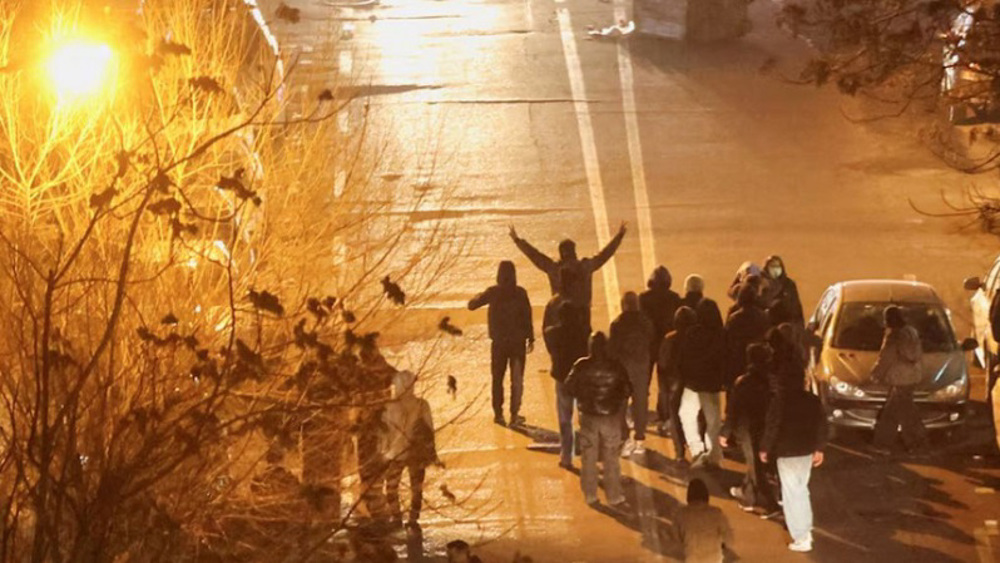





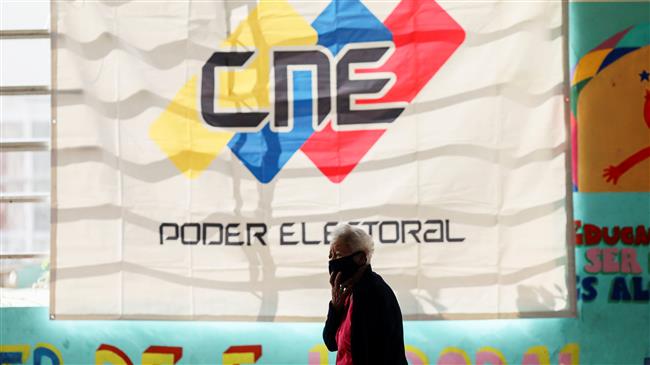



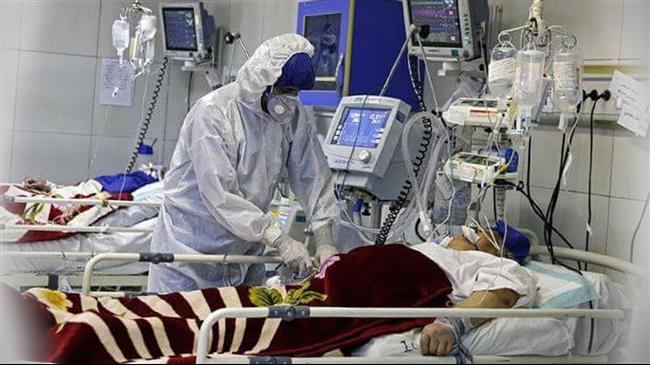




 This makes it easy to access the Press TV website
This makes it easy to access the Press TV website